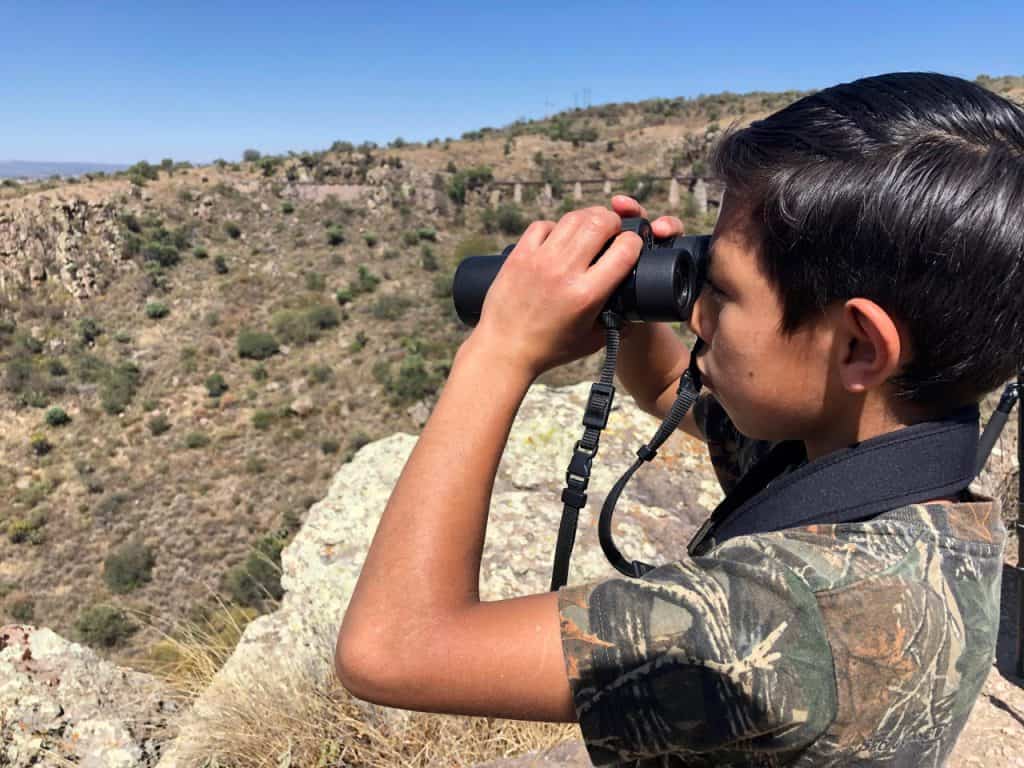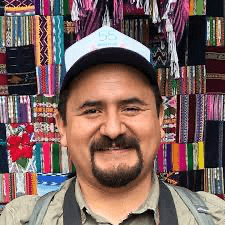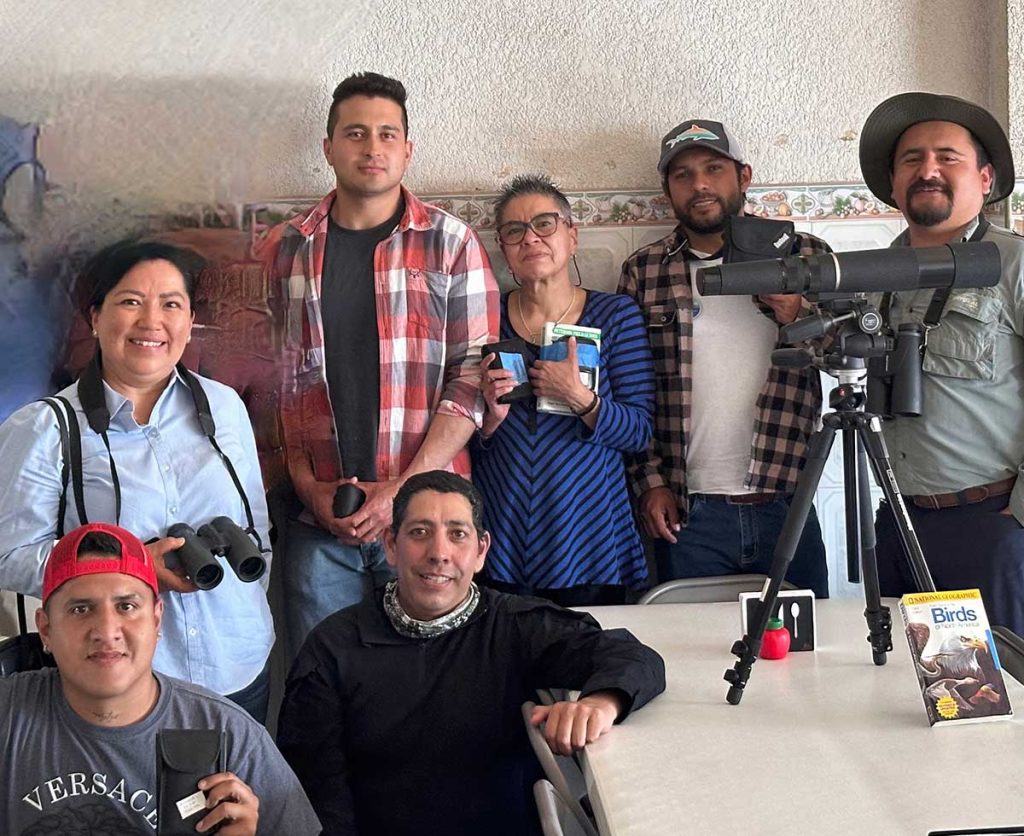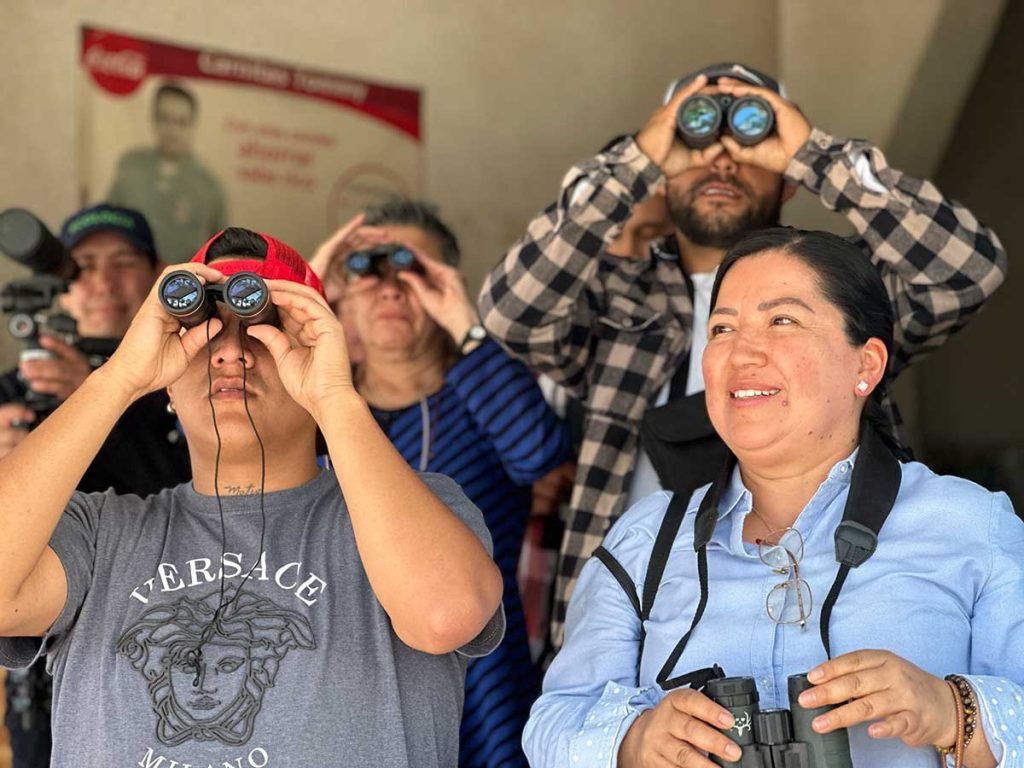
THE GRAEME GIBSON PRISMÁTICOS PROJECT
Have binoculars or spotting scopes you no longer use? Give them a new home with the Graeme Gibson Prismáticos* Project. This PIBO-sponsored program distributes donated birding optics to classrooms, field workers, and conservation groups in San Miguel de Allende, a small city that lies at the geographic centre of Mexico in the state of Guanajuato, the wintering grounds for many of the birds that breed in Ontario and migrate through Pelee Island.
*Prismáticos is an old Spanish word for binoculars.
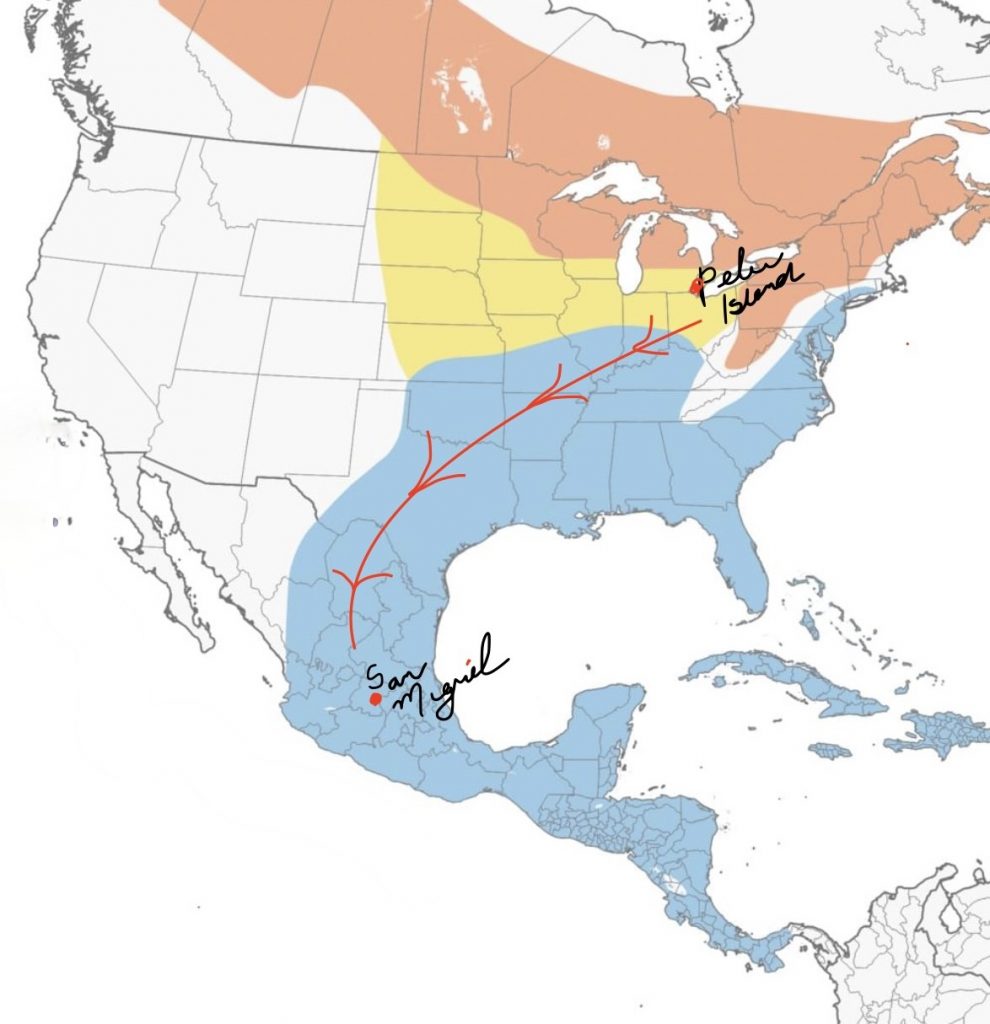
The state of Guanajuato has a population of 6 million, the same as Ontario, although it is only one-thirtieth the size. Conservation efforts in Mexico are in their infancy, yet vital to protecting habitat where migratory birds rest and replenish themselves for the long flight north to their breeding grounds in Canada.
Binoculars are beyond the means of most Mexican families and organizations—many school children, and even guides and rangers, have never seen a bird up close.
Help bring Nature into focus in this part of the world. If you have binoculars or birding scopes you no longer need, donate them to the Primsáticos Project and we’ll find them new homes in the songbird wintering grounds of Mexico.
NOTE: Donated binoculars and scopes must be in good working order.
What We Hope to Achieve
Our Mexican partner, Rodrigo López, is a birding guide and conservationist who first identified the need for binoculars in his work with local schools in San Miguel de Allende, introducing 8- to 11-year-olds to nature through Audubon de México’s program, Niños y Naturaleza (Children and Nature). Conservation efforts are far more effective when the birds and habitats that need protecting can actually be seen.
Rodrigo also works with environmental groups to foster conservation efforts and protect bird habitat, and has created several local, state, and flyway corridor birder networks. He has found that the lack of basic field equipment—binoculars, spotting scopes, and bird books—is profound and widespread. Some of the park rangers he trains have never owned a pair of binoculars.
The Graeme Gibson Prismáticos Project aims to help conservationists like Rodrigo bring birds and people together.
PIBO in Mexico: The Prismaticos Project 2024
The second year of PIBO’s Graeme Gibson Prismaticos Project is underway. We gathered used binoculars, spotting scopes and bird books in Canada to distribute to forest rangers, nature guides, and school classrooms in Mexico. Over the winter, our Mexican partner, Rodrigo Lopez, sent out dozens of request forms, and from among those who applied he selected eight recipients whose needs were most urgent.
This March, for Phase One, he travelled to the city of Chupícuaro, in southwestern Guanajuato state, to deliver seven pairs of binoculars and a spotting scope to a group of volunteer guardabosques (forest rangers) who until now have been monitoring the region’s songbird and shorebird populations without the aid of optics.
The recipients were Juan Salinas, Lourdes Marmolejo, Lucila Sanchez, Alan Camacho, Gustavo Gonzales, and José de Jésus Vega, all of whom volunteer with the Environmental Department of the city of Acámbaro, which has authority for Chupícuaro. As well as keeping watch on nature areas, protecting them from fire, poachers and illicit logging, the group conducts bird counts on Global Big Day, organizes Christmas Bird Counts in their area, makes annual shorebird surveys on Lago de Cuitzeo and the nearby Pressa Solis, and contributes to DUMAC, Ducks Unlimited de Mexico’s annual duck monitoring program in Mexico’s Central Highlands.
“It’s hard to monitor shorebirds without the proper equipment,” says Alejandro Morales, environmental supervisor for Acámbaro. PIBO also provided the group with two field guides, Petersen’s Birds of Mexico and Audubon’s Birds of North America, to assist in species identification. “With good binoculars and scopes and these field guides, our counts will be more accurate, more useful – and our work much more satisfying.”
The Chupícuaro volunteers also monitor two species in their region that require special attention: the endemic Aztec rail, and the vulnerble Black-polled yellowthroat, which is known in only four areas of central Mexico. Identifying the birds’ nesting and feeding areas within the Sierra de los Agostinos nature preserve is crucial to protecting those species, and extremely difficult without binoculars.
Phase Two will take place in the near future, once Rodrigo has identified recipients for the second batch of optics waiting to be distributed. Last year, PIBO awarded 12 pairs of binoculars to two schools in Queretaro State, and to volunteers in Acámbaro. This year, the Prismaticos Project received 24 pairs of donated binoculars and 7 spotting scopes, as well as 26 birding guides, for distribution down south.
While PIBO focuses on the well-being of migrating birds in the north, through the Prismaticos Project we also recognize that monitoring birds in Ontario is only half the story: the birds that migrate over Pelee Island need monitoring and protection in their southern wintering grounds as well. “We’re making a huge difference,” says Rodrigo Lopez, “not only in the work being done now, but also in the important work waiting to be done by the next generation of environmental field workers in Mexico.”
How the Graeme Gibson Prismáticos Project Works
Donations are collected year-round, using the downloadable Donor Form. Donations are assessed by PIBO volunteers to ensure they are in good working order. Useable optics are then stored by PIBO until the autumn, when they are transported to San Miguel de Allende, Mexico, by project coordinators.
Donated binoculars and spotting scopes are distributed on a request basis to schools and conservationist groups and individuals who have established a need for the equipment, using the downloadable Request Form. Recipients agree to help stimulate interest in bird conservation.
A thank-you letter is sent to donors, and we keep a record of recipients, too. Periodically, we publish accounts here and in The Auspice, PIBO’s newsletter, telling the stories of those who have received the optics and how they have been used to further the cause of birding and bird habitat protection.
NOTE: Donated equipment will not be sold.
GRAEME GIBSON (1934-2019) founded the Pelee Island Bird Observatory and served as its first chair of the board. A novelist and essayist, author of the “compulsively readable” The Bedside Book of Birds: An Avian Miscellany, Graeme’s love letter to the deep relationships between humans and birds.
“He was always more interested in watching a bird’s behaviour than in checking it off the list,” says his partner of forty years, Margaret Atwood.
Graeme was a lifelong advocate of birds and bird conservation. He was on the Council of the World Wildlife Fund and with Margaret Atwood, co-chaired Birdlife International’s Rare Bird Club. Graeme was also a Fellow of the Royal Canadian Geographical Society and in 2015 was awarded the Society’s Gold Medal. In 1992, he received the Order of Canada.
Graeme travelled extensively and for a treasured time, lived in Mexico, where he came to appreciate the dual lives and habitats of migrating birds. His legacy can be felt wherever birds are valued, particularly in the ongoing work of the Pelee Island Bird Observatory.
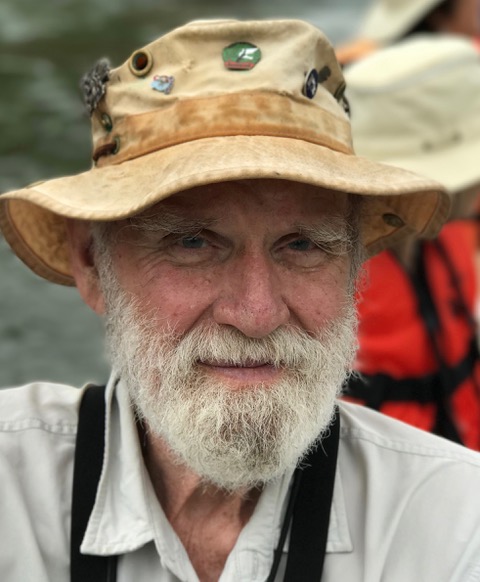
HOW TO DONATE
Bring your used binoculars and scopes to Pelee Island!
You’ll find a “Bins Bin” at the Pelee Island Bird Observatory, the Pelee Island Heritage Centre, and at the Baillie Birdathon, held the second weekend in May—and at every PIBO in-person fund-raising event.
Email for information about an event close to you.
Or send your well-packaged binoculars to:
The Graeme Gibson Prismáticos Project
c/o Merilyn Simonds/Wayne Grady
#36-1 Place d’Armes
Kingston, ON, CANADA K7K 6S1
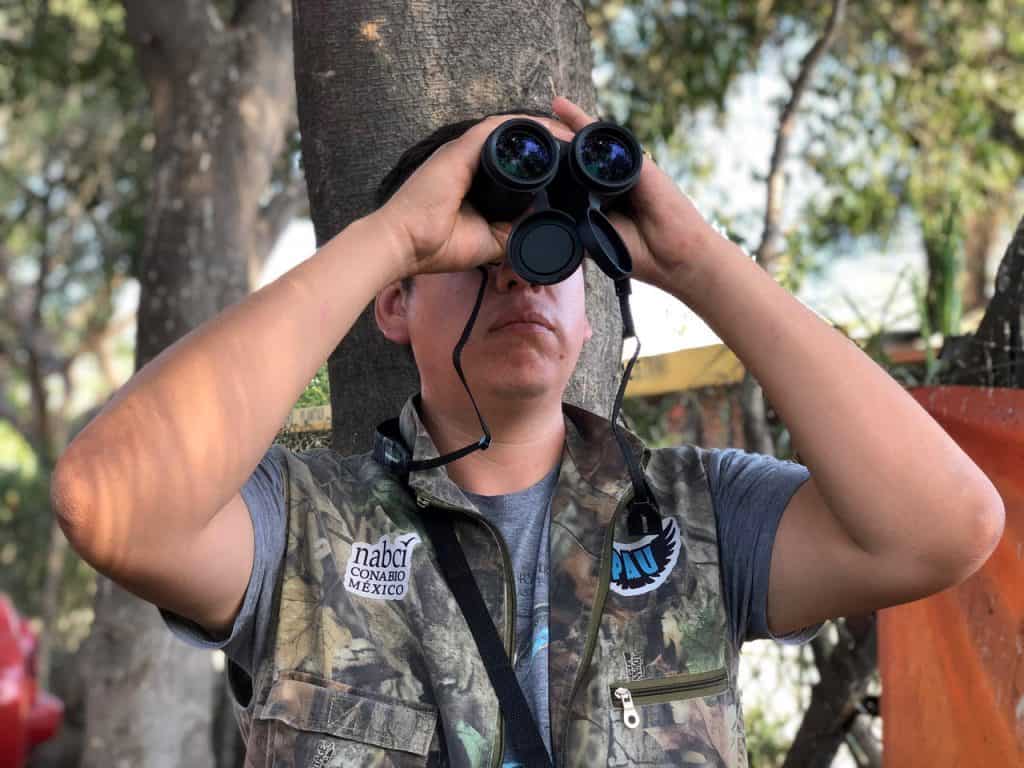
Thank you!
for helping to bring birds into focus in their winter feeding grounds
